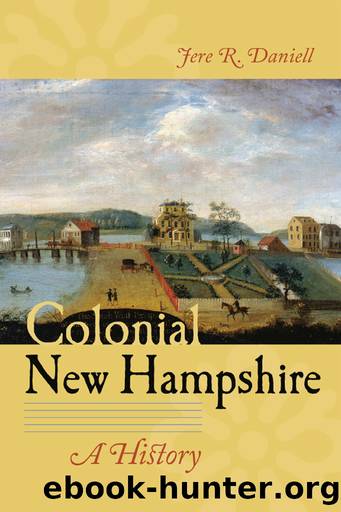Colonial New Hampshire by Jere R. Daniell

Author:Jere R. Daniell [Daniell, Jere R.]
Language: eng
Format: epub
Tags: History, United States, Colonial Period (1600-1775), State & Local, New England (CT; MA; ME; NH; RI; VT)
ISBN: 9781611688788
Google: m8BRCgAAQBAJ
Publisher: University Press of New England
Published: 2015-08-04T03:12:47+00:00
It is difficult to generalize about the process of town founding. Although the Governor and Council chartered most towns in accordance with royal instructions, in some instances private landowners did the initial granting. Many townships possessed the right of self-government when established but many did not, and in a few the question was left hanging. The Massachusetts and New Hampshire governments, individual investors, surveyors, and the men who settled the land all played important roles in shaping town boundaries. Original grants often were declared invalid and the towns rechartered. Anyone who attempts a systematic reading of New Hampshire local histories quickly learns how varied were the origins of individual towns within the state.
Nevertheless, some broad configurations may be drawn. Four basic patterns characterized town founding in the period between 1715 and 1765. One involved a sequence of subdivisions within the original boundaries of Portsmouth, Hampton, Exeter, and Dover, and paralleled a process which had taken place earlier in many eastern Massachusetts townships. Most towns formed in this manner began as separate church jurisdictions; when erected into towns they were immediately granted the governmental privileges of their parent communities. Newcastle and Kingston had been incorporated before 1715. Seventeen more towns were founded in the region during the next half century and three others after that.
Initially, the splitting off process was both lengthy and controversial. In the case of Hampton Falls, for example, it began in 1709 with a petition by inhabitants south of the main river in Hampton for the right to choose their own minister. Despite protests from other town residents the government eventually formed a parishâthe institution existing both in England and in Massachusettsâin the section where the petitioners lived. Soon the parish took on civil as well as religious functions. In 1717 town authorities tried to tax parish members for school support but were told by the Council they could not. Shortly thereafter the Council voted to give Hampton Falls virtually all the privileges of a town, including the right to representation in the Assembly. Again there was opposition from outside the parish. Continued jurisdictional conflict produced a subsequent resolution that the parish had town privileges âwithout exceptionâ; Hampton Falls was formally incorporated in 1726. Separation of the Oyster River section of Dover took even longer. As early as 1669 inhabitants asked to become a town and were still asking sixty years later. Oyster River was finally incorporated as Durham in 1732.
As time passed, however, the people of eastern New Hampshire became more accustomed to seeing their towns divided. The provincial government helped by regularizing the process. It adopted a policy of approving all petitions for separate parishes if the petitioners seemed numerous and prosperous enough to support a church, and if the separation made geographical sense. It clarified parish rights, granted formal town incorporation as soon as conditions warranted, and helped settle any conflict over boundaries. Townsmen themselves became less opposed to subdivision. Experience indicated that smaller townships were easier to manage and less subject to civil and religious conflict.
Download
This site does not store any files on its server. We only index and link to content provided by other sites. Please contact the content providers to delete copyright contents if any and email us, we'll remove relevant links or contents immediately.
| Americas | African Americans |
| Civil War | Colonial Period |
| Immigrants | Revolution & Founding |
| State & Local |
In Cold Blood by Truman Capote(3374)
The Innovators: How a Group of Hackers, Geniuses, and Geeks Created the Digital Revolution by Walter Isaacson(3145)
Steve Jobs by Walter Isaacson(2889)
All the President's Men by Carl Bernstein & Bob Woodward(2363)
Lonely Planet New York City by Lonely Planet(2216)
And the Band Played On by Randy Shilts(2197)
The Room Where It Happened by John Bolton;(2150)
The Poisoner's Handbook by Deborah Blum(2135)
The Innovators by Walter Isaacson(2096)
The Murder of Marilyn Monroe by Jay Margolis(2094)
Lincoln by David Herbert Donald(1981)
A Colony in a Nation by Chris Hayes(1927)
Being George Washington by Beck Glenn(1910)
Under the Banner of Heaven: A Story of Violent Faith by Jon Krakauer(1788)
Amelia Earhart by Doris L. Rich(1687)
The Unsettlers by Mark Sundeen(1682)
Dirt by Bill Buford(1669)
Birdmen by Lawrence Goldstone(1662)
Zeitoun by Dave Eggers(1643)
